Economic Development Program
The Livelihood sector of Wahana Visi Indonesia aims to address poverty that impacted the low capacity of parents/caregivers to provide children’s needs (continue their schools, three times meals, and access to health services)
Food Security
Food security is when all people at all times have physical, social, and economic access to food, which is safe and consumed in sufficient quantity and quality to meet their dietary needs and food preferences and is supported by an environment of adequate sanitation, health services, and care, allowing for a healthy and active life. The four pillars of food security are Availability, Accessibility, Utilization, and Stability. Through the kitchen garden, the parents are equipped with skills training to create a nutrition garden, harvest crops from the nutrition garden, and provide it for their children to improve their health.
- 2,980 parents or caregivers were trained in home food gardens/nutrition gardens/vegetable gardens and meal preparation.
- 10,644 children were supported through WVI nutrition programs
- 3,463 children and mothers consumed vegetables from the new nutrition garden.
Livelihood
- 4,215 farmers were supported through livelihood training (organic farming, tilapia fish farm)
- 9,205 children were in households where parents or caregivers were supported by WVI-supported livelihoods programming
- 1,894 households were provided with livelihood physical assets/supports (e.g., livestock, agriculture, tools, etc., excluding Cash & Vouchers)
- 48,160 farmers received assistance from WVI
- 15,646 people received Good Agricultural Practices training.
The assistance was distributed in the form of banana seedlings (7,000), ponds (9), drill holes (1), and tilapia seeds (630) through the FORTE project by the Ternate Area Program. The results of the evaluation in the Ternate Area Program were that training and mentoring could increase farmer’s resilience and knowledge. However, capacity building was still needed to ensure sustainable profits/income (Evaluation Report, 2021).
Financial Inclusion
Financial Inclusion means that every person (including the most vulnerable) has access to valuable and affordable financial products and services that meet their needs. According to the latest Findex data (2021 data forthcoming), nearly one-third of adults – 1.7 billion – were still unbanked in 2017. Financial inclusion has been identified as an enabler for 7 of the 17 Sustainable Development Goals. Since 2012, WVI, through Savings for Transformation groups _Accumulating Saving and Credit Associations (ASCA)_ has promoted households to improve their financial literacy practices in various areas. During the COVID-19 pandemic, the family participation in savings and loan groups helped members. The number of groups up to the end of 2022 was 691 groups with 11,683 members. The savings and the community’s assets currently reach more than 5 billion rupiah.
From 2018 to 2022, WVI delivered social protection to 431,161 people through the Cash and Voucher Program (CVP) with a total assistance of IDR 84,323,078,200,- as a modality to support affected communities through livelihood recovery assistance and building community resilience.
Approach
- Farmer Managed Natural Regeneration (FMNR) is an approach to restoring and improving aricultural, forested, and pasturelands that is fast, low cost, and easy to replicate.
- Market System Development (MSD) is focused on improving essential supporting functions and rules and regulations relevant to the market transactions in question. This is done through promoting changes in the behaviors and capacities of private-sector actors, public-sector actors, and civil society organizations, as well as their relationships with each other.
- Inclusive Market Sistem Development (iMSD) is a facilitative approach that analyses systemic constraints in the market system—working within value chains to benefit households and individuals. Interventions incentivize market actors to change how they operate to benefit the poor.
- Saving for Transformation (S4T) _Accumulating Saving and Credit Association (ASCA)_ facilitates a sustainable platform for families to access savings and small loans. S4T builds resilience by enabling community members to develop skills and access to funds to cope with household emergencies, learn long-term coping strategies, focus on the health, nutrition, and education of their children, and invest in their livelihoods
- Local Value Chain Development (LVCD) aims to expand producer knowledge of particular value chains and market demand and create sustainable business models so producers can increase their income and improve their livelihoods.
- Strengthening the village-owned enterprise (Bumdes). WVI also provided some efforts to support Bumdes in the marketing process.
- Partnership: facilitate business actors (private sector partners, ISPs, and farmers) collaborating in potential sectors. Collective marketing program interventions were able to help members continue marketing agricultural products through the established collaborative marketing network. The involvement with market players (PSP and ISP) was carried out in the Moringa, Eggciting, Cocoa Life, ICOPE, and several AP projects to bring the community closer to getting farming business facilities, micro-enterprises, and open more comprehensive market access.
Contact Person:
Yohana Benu (Head of Grant & Contract Acquisition Management)
Email: [email protected]

